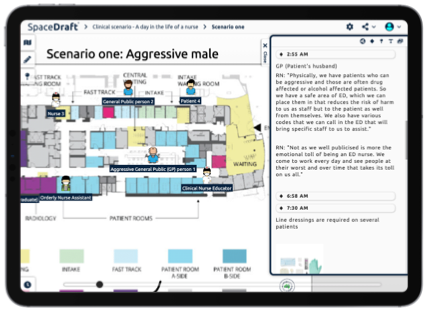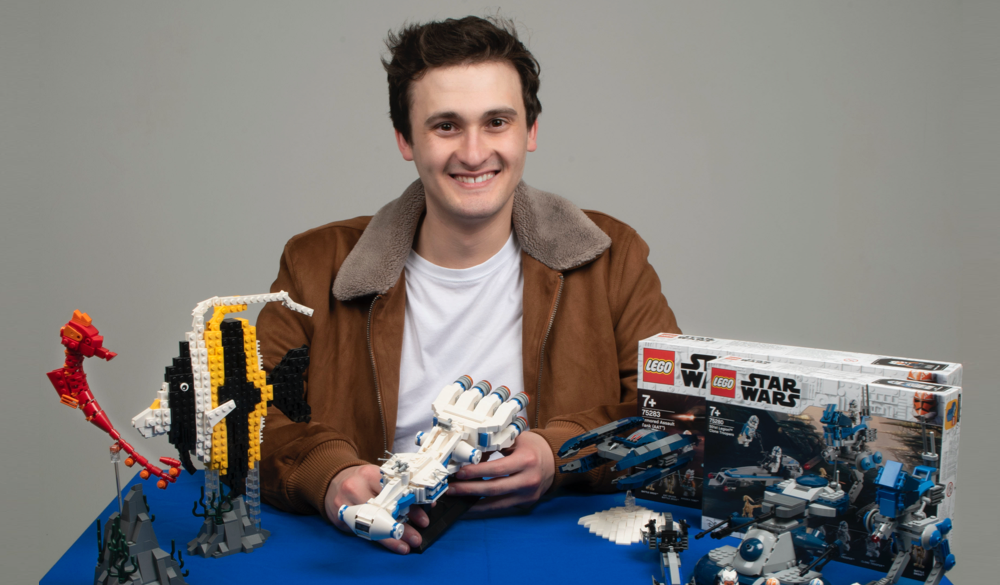We sat down with Rachael Kostusik, Graduate Research Candidate at Murdoch University, and talked about how SpaceDraft could be used in medical training. Rachael is conducting research on experiential learning process through medical improvisation.
Overview
‘Medical improv’ is an emerging subset of comedic performance art using improvisational theatre principles and training techniques to improve communication, cognition, and teamwork among health care professionals.
As a professional theatre improvisor I am dedicated to exploring innovative ways to improve people’s lives from everyday life to professional vocation.
Improvisation is ‘serious play’ when applied outside of the theatrical context and placed inside a medical context. Combined with SpaceDraft it can offer an iterative experiential learning process.
80% of medical errors are due to failure of human factors. Applied Improvisation & SpaceDraft is an opportunity to develop non-technical skills to avoid adverse events.
 Improve higher order thinking with a quality and safety agenda.
Improve higher order thinking with a quality and safety agenda.
 Enhance Situational Awareness (SA) Perception, comprehension, projection – key factor in delivery of safe patient care.
Enhance Situational Awareness (SA) Perception, comprehension, projection – key factor in delivery of safe patient care.
 Learner-centric flexible, engaging experiential tool for busy professionals.
Learner-centric flexible, engaging experiential tool for busy professionals.
When Improvisation is combined with SpaceDraft it offers a unique visual tool for medical professionals to communicate any scenario in a neat, visual, easy to understand digital format. Good communication is at the core of all good medical care.
Rachael Kostusik
Existing Challenges
How can we build on the implied gap between simulations, clinical practice and working in the field?
SpaceDraft and Applied Improvisation Exercises are a powerful combination enabling the much needed development of higher order thinking.
-
On the spot debrief/reflection tool for spontaneous point of care teaching.
-
Refresher course to reinforce prior learning ie. Clinical competence.
-
Communication Coaching tool for graduate staff training.
-
Maintenance training for general staff.
A unique learning modality, offering adaptive improvisational theatre exercises and principles combined with the SpaceDraft visual tool, to augment non-technical medical skills; ‘communication, teamwork, and cognition’ to enhance patient wellbeing.
Furthermore, improvisation has been portrayed as a humorous, engaging experience; that in itself can offer a positive mental wealth experience.

Solutions
SpaceDraft combined with Applied Improvisation Exercises will prove to be a powerful learning combination.
SpaceDraft has unlimited potential resolves in a medical setting.
Debrief tool
Ensure mental wealth is optimum.Pedagogical tool
Reflection to enhance critical thinking skillsMaintenance
Building on prior knowledge of non-technical skills ie. Situational Awareness, communication skillsResults
Graduate Nurses, for example, utilise SpaceDraft to recall scenarios and debrief or reflect on events in situ whilst in their recent memory.
It enables nurses to practice communicating their findings and future states clearly and concisely.
Enrich malleable non-technical skills possessed by nurses. Build on their personal, conceptual and cognitive human factors for transformational change.
- It is different to simulated learning, it offers an immediate tool for application in a ‘live’ setting, meaning it can be used in real-time for example on a digital tablet in clinical competence assessment follow-ups or directly following a traumatic work episode.
- It can also be used as an opportunity to participate in a refresher course to reinforce prior learning.
It has the potential to be useful for nursing graduate staff and experienced nursing staff as a general maintenance tool.
SpaceDraft will offer an efficient way to communicate any medical scenario in real-time (virtual) and can be easily implemented and accessed online. These learning strategies can be practised in a simulated lab environment; however, the e-tool can also be utilised in situ. For example in a post-traumatic incident debrief, to help the staff visually reflect and recall, allowing them to process traumatic experiences. It offers a debrief and reflection tool for spontaneous point-of care-teaching. It works as a communication coaching tool.
Future Plans
The concept of Improvisation, with its focus on the idea of situatedness, capacity for revision, and ongoing open- ended transformation will enable not only nurses but any professional the chance to metamorphose their lives in personal communications and professional practice.
I can envisage improvisation and SpaceDraft as a pedagogical e-tool to be the answer to ‘wicked’ problems in an uncertain, changing world.
Rachael Kostusik

